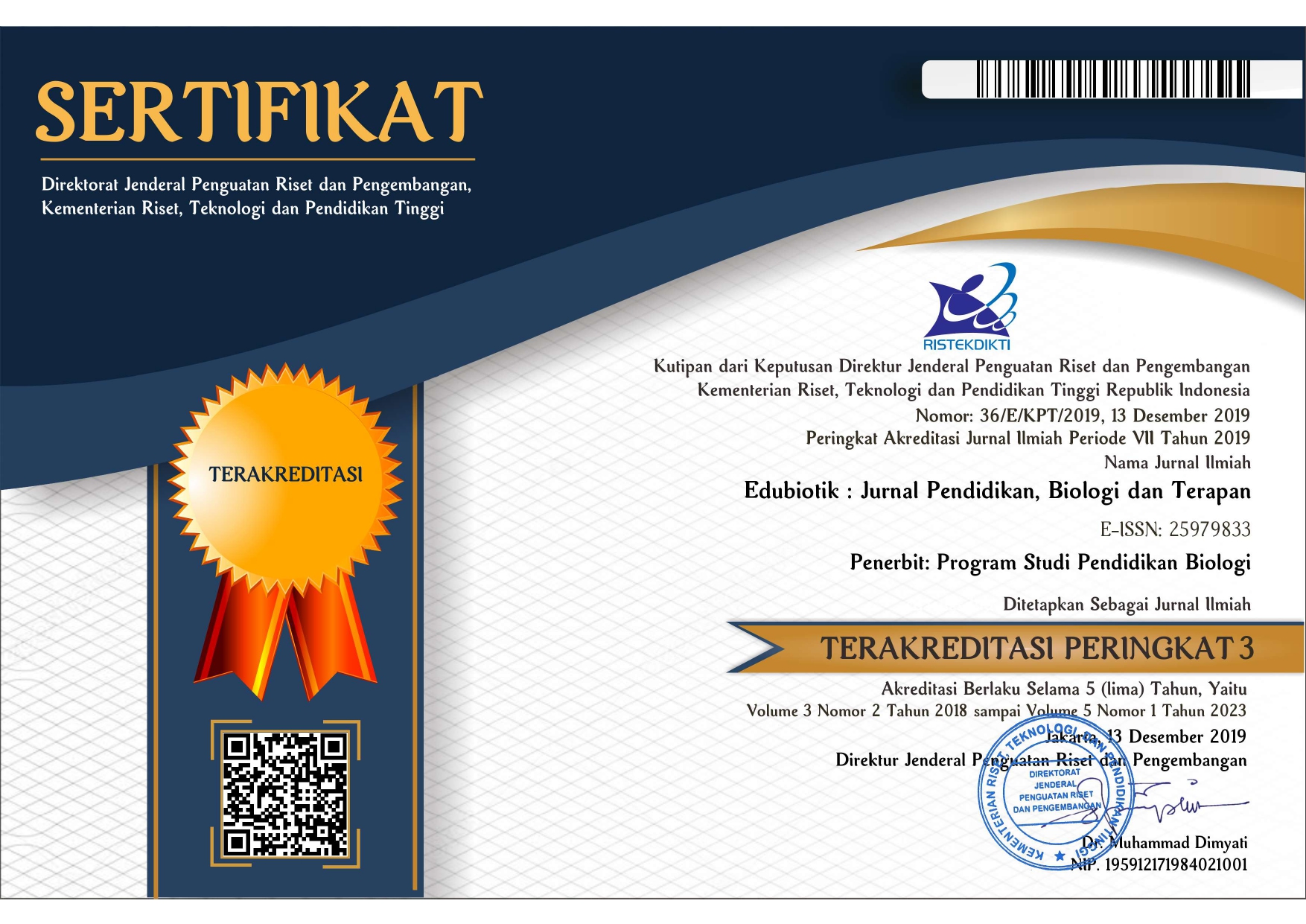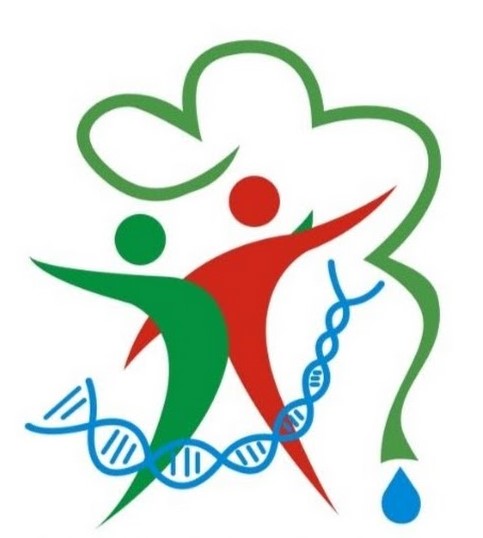Environmental learning student’s worksheet of air pollution (eswopol): inovasi lembar kerja siswa berbasis hots-aep
Abstract
Environmental problems need to be solved by students' HOTS abilities. This research aimed to develop environmental learning student's worksheet of air pollution (eswopol) based on Higher Order Thinking Skills Assessment based on Environmental Problems (HOTS-AEP). The research method used research and development that modified from Borg and Gall model. The study was conducted in December 2019 until January 2020. The research instrument used the interview transcript and validation questionnaire. The research data obtained in the form of an average score of validation results. The data analysis technique used is descriptive. The results showed that the environmental learning student's worksheet of air pollution (eswopol) based on HOTS-AEP was declared valid with an average validation score of 3.55 (very valid category). The conclusion of this research is eswopol based on HOTS-AEP is appropriate for use in a learning environment.
References
Aisyah, A., Salehuddin, K., Aman, I., Yasin, R., & Mimiko, N. (2018). Eliciting Elements of Higher Order Thinking Skills In the Higher Secondary Examination Question Structure In Japan And Malaysia Aznur. In Proceedings of the Regional Conference on Science, Technology and Social Sciences (RCSTSS 2016) (pp. 455–464). Springer Singapore. https://doi.org/10.1007/978-981-13-0074-5
Aizikovitsh-Udi, E., & Amit, M. (2011). Developing The Skills of Critical And Creative Thinking By Probability Teaching. Procedia - Social and Behavioral Sciences, 15, 1087–1091. https://doi.org/10.1016/j.sbspro.2011.03.243
Ama, S. T. A., & Mistianah, M. (2018). Pengembangan Lembar Kerja Siswa (LKS) Berbasis Predict Observe Explain Materi Sistem Pencernaan Dan Pernapasan Pada Manusia Di Kelas XI SMA. Edubiotik : Jurnal Pendidikan, Biologi Dan Terapan, 3(2), 19–22. https://doi.org/10.33503/ebio.v3i02.171
Arnon, S., Orion, N., & Carmi, N. (2015). Environmental Literacy Components And Their Promotion By Institutions of Higher Education: An Israeli Case Study. Environmental Education Research, 21(7), 1029–1055. https://doi.org/10.1080/13504622.2014.966656
Avan, C., Aydinli, B., Bakar, F., & Alboga, Y. (2011). Preparing Attitude Scale To Define Students’ Attitudes About Environment, Recycling, Plastic and Plastic Waste. International Electronic Journal of Environmental Education, 1(3), 179–191. Retrieved from https://dergipark.org.tr/en/pub/iejeegreen/issue/7905/104039
Boholano, H. B. (2017). Smart Social Networking: 21st Century Teaching And Learning Skills. Research in Pedagogy, 7(1), 21–29. https://doi.org/10.17810/2015.45
Chander, P., & Muthukrishnan, S. (2015). Green Consumerism And Pollution Control. Journal of Economic Behavior and Organization, 114, 27–35. https://doi.org/10.1016/j.jebo.2015.02.013
Choudri, B. S., Baawain, M., Al-Zeidi, K., Al-Nofli, H., Al-Busaidi, R., & Al-Fazari, K. (2017). Citizen Perception On Environmental Responsibility of The Corporate Sector In Rural Areas. Environment, Development and Sustainability, 19(6), 2565–2576. https://doi.org/10.1007/s10668-016-9855-y
Derevenskaia, O. (2014). Active Learning Methods in Environmental Education of Students. Procedia - Social and Behavioral Sciences, 131, 101–104. https://doi.org/10.1016/j.sbspro.2014.04.086
Derman, M., & Gurbuz, H. (2018). Environmental Education In the Science Curriculum In Different Countries: Turkey, Australia, Singapore, Ireland, and Canada. Journal of Education in Science, Environment and Health, 129–141. https://doi.org/10.21891/jeseh.409495
DeSchryver, M. (2017). Using the Web as a Higher Order Thinking Partner: Case Study of an Advanced Learner Creatively Synthesizing Knowledge on the Web. Journal of Educational Computing Research (Vol. 55). https://doi.org/10.1177/0735633116667356
Domínguez-Domínguez, M., Zavala-Cruz, J., Rincón-Ramírez, J. A., & Martínez-Zurimendi, P. (2019). Management Strategies For The Conservation, Restoration And Utilization of Mangroves In Southeastern Mexico. Wetlands. https://doi.org/10.1007/s13157-019-01136-z
Farisi, M. I. (2016). Developing The 21 st-Century Social Studies Skills Through Technology Integration. Turkish Online Journal of Distance Education-TOJDE, 17(1), 16–30. https://doi.org/10.17718/tojde.47374
Gall, M. D., Gall, J. P., & Borg, W. R. (2003). Educational Research An Introduction. San Fransisco: Pearson Education. Retrieved from https://epdf.pub/educational-research-an-introduction-7th-edition.html
Garcia, L. C. (2015). Environmental Science Issues For Higher- Order Thinking Skills (HOTS) Development: A Case Study In The Philippines. In Biology Education and Research in a Changing Planet (pp. 45–54). https://doi.org/10.1007/978-981-287-524-2
Golitsyna, I. (2017). Educational Process In Electronic Information-Educational Environment. Procedia - Social and Behavioral Sciences, 237, 939–944. https://doi.org/10.1016/j.sbspro.2017.02.132
Heinrichs, C. R. (2016). Exploring The Influence of 21st Century Skills In A Dual Language Program: A Case Study. International Journal of Teacher Leadership Heinrichs - Exploring the Influence, 37(1), 37–56. Retrieved from http://files.eric.ed.gov/fulltext/EJ1137667.pdf
Hugerat, M., & Kortam, N. (2014). Improving Higher Order Thinking Skills Among Freshmen By Teaching Science Through Inquiry. Eurasia Journal of Mathematics, Science and Technology Education, 10(5), 447–454. https://doi.org/10.12973/eurasia.2014.1107a
Husamah, H., Fatmawati, D., & Setyawan, D. (2018). Oidde Learning Model : Improving Higher Order Thinking Skills of Biology Teacher Candidates. International Journal of Instruction, 11(2), 249–264. https://doi.org/10.12973/iji.2018.11217a
Ichsan, I. Z., Hasanah, R., Aini, S., Ristanto, R. H., & Miarsyah, M. (2019). Higher Order Thinking Skills Assessment Based On Environmental Problem (HOTS-AEP): Mendesain Evaluasi Pembelajaran Abad 21. Jurnal Biotek, 7(1), 14–26. https://doi.org/10.24252/jb.v7i1.7939
Iriani, E. (2019). Peningkatan Hasil Belajar Siswa Sekolah Dasar Menggunakan Media Kertas Bergambar Pada Materi Perkembangbiakan Tumbuhan Tema 1. Edubiotik : Jurnal Pendidikan, Biologi Dan Terapan, 4(2), 93–100. https://doi.org/10.33503/ebio.v4i02.505
Istiyono, E., Dwandaru, W. S. B., Setiawan, R., & Megawati, I. (2019). Developing of Computerized Adaptive Testing to Measure Physics Higher Order Thinking Skills of Senior High School Students And Its Feasibility of Use. European Journal of Educational Research, 9(1), 91–101. https://doi.org/10.12973/eu-jer.9.1.91
Ito, H., & Kawazoe, N. (2015). Active Learning for Creating Innovators: Employability Skills beyond Industrial Needs. International Journal of Higher Education, 4(2), 81–91. https://doi.org/10.5430/ijhe.v4n2p81
Karaarslan, G., & Teksöz, G. (2016). Integrating Sustainable Development Concept Into Science Education Program Is Not Enough; We Need Competent Science Teachers for Education for Sustainable Development--Turkish Experience. International Journal of Environmental and Science Education, 11(15), 8403–8425. Retrieved from http://login.ezproxy1.lib.asu.edu/login?url= https://search.proquest.com/docview/1871582332?accountid=4485
Kartikaningtyas, V., Kusmayadi, T. A., & Riyadi, R. (2018). The Effect of Brain Based Learning With Contextual Approach Viewed From Adversity Quotient. Journal of Physics: Conference Series, 1022. Retrieved from https://iopscience.iop.org/article/10.1088/1742-6596/1022/1/012014
Kivunja, C. (2014). Teaching Students To Learn And To Work Well With 21st Century Skills: Unpacking The Career And Life Skills Domain of The New Learning Paradigm. International Journal of Higher Education, 4(1), 1–11. https://doi.org/10.5430/ijhe.v4n1p1
Lee, A. Y. L. (2016). Media Education In The School 2.0 era: Teaching Media Literacy Through Laptop Computers And Ipads. Global Media and China. https://doi.org/10.1177/2059436416667129
Lee, K., & Lai, Y. (2017). Facilitating Higher-Order Thinking With The Flipped Classroom Model: A Student Teacher’s Experience In A Hong Kong Secondary School. Research and Practice in Technology Enhanced Learning, 12(1). https://doi.org/10.1186/s41039-017-0048-6
Lemus, J. D., Seraphin, K. D., Coopersmith, A., & Correa, C. K. V. (2014). Infusing Traditional Knowledge And Ways Of Knowing Into Science Communication Courses At The University of Hawai‘i. Journal of Geoscience Education, 62(1), 5–10. https://doi.org/10.5408/12-416.1
Margono, B. A., Potapov, P. V., Turubanova, S., Stolle, F., & Hansen, M. C. (2014). Primary Forest Cover Loss In Indonesia Over 2000-2012. Nature Climate Change, 4(8), 730–735. https://doi.org/10.1038/nclimate2277
Miarsyah, M., Sigit, D. V, Ichsan, I. Z., Fadrikal, R., & Suprapto, M. (2019). Lekersmulia: Improving Indonesian Students’ Environmental Responsibility Using Multimedia In Environmental Learning. International Journal of Scientific and Technology Research, 8(12), 1639–1643. Retrieved from http://www.ijstr.org/final-print/dec2019/Lekersmulia-Improving-Indonesian-Students-Environmental-Responsibility-Using-Multimedia-In-Environmental-Learning.pdf
Miharja, F. J., Hindun, I., & Fauzi, A. (2019). Critical Thinking, Metacognitive Skills, And Cognitive Learning Outcomes: A Correlation Study In Genetic. Biosfer : Jurnal Pendidikan Biologi, 12(2), 135–143. https://doi.org/10.21009/biosferjpb.v12n2.135-143
Murzi, H., Mazzurco, A., Pikaar, I., & Gibbes, B. (2019). Measuring Development of Environmental Awareness And Moral Reasoning: A Case-Study of A Civil Engineering Course. European Journal of Engineering Education, 44(6), 954–968. https://doi.org/10.1080/03043797.2019.1566300
Nabilah, S., Anwar, Y., & Riyanto, R. (2019). Motoric Mechanism With Problem-Based Learning: Impact On Students’ Higher-Order Thinking Skills. Biosfer: Jurnal Pendidikan Biologi, 12(2), 182–193. https://doi.org/10.21009/biosferjpb.v12n2.182-193
Olsson, M., & Kjällstrand, J. (2006). Low Emissions From Wood Burning In An Ecolabelled Residential Boiler. Atmospheric Environment, 40(6), 1148–1158. https://doi.org/10.1016/j.atmosenv.2005.11.008
Paristiowati, M., Hadinugrahaningsih, T., Purwanto, A., & Karyadi, P. A. (2019). Analysis of Students’ Scientific Literacy In Contextual-Flipped Classroom Learning On Acid-Base Topic. Journal of Physics: Conference Series, 1156(1), 12026. https://doi.org/10.1088/1742-6596/1156/1/012026
Permana, F. H., & Chamisijatin, L. (2019). Project-Based Learning Through Edmodo: Improving Critical Thinking And Histology Concepts. Biosfer: Jurnal Pendidikan Biologi, 12(1), 58–69. https://doi.org/10.21009/biosferjpb.v12n1.58-69
Rahmayanti, H., & Ananda, S. (2017). Analysis of Environmental Infrastructure Sustainability of Low Cost Apartment: Rusunawa in Jakarta. International Journal of Social Ecology and Sustainable Development, 8(2), 1–13. https://doi.org/10.4018/IJSESD.2017040101
Rahmayanti, H., Oktaviani, V., & Syani, Y. (2020). Development of Sorting Waste Game Android Based For Early Childhood In Environmental Education. Journal of Physics: Conference Series, 1434(1), 12029. https://doi.org/10.1088/1742-6596/1434/1/012029
Ratumanan, T., & Laurens, T. (2006). Evaluasi Hasil Belajar Yang Relevan Dengan Kurikulum Berbasis Kompetensi. Surabaya: Unesa University Press.
Sadiqin, I. K., Santoso, U. T., & Sholahuddin, A. (2017). Students’ Difficulties On Science Learning With Prototype Problem-Solving Based Teaching And Learning Material : A Study Evaluation of Development Research. Advances in Social Science, Education and Humanities Research, 100, 279–282. https://doi.org/10.2991/seadric-17.2017.58
Sahronih, S., Purwanto, A., & Sumantri, M. S. (2019). The Effect of Interactive Learning Media On Students’ Science Learning Outcomes. ACM International Conference Proceeding Series, 20–24. https://doi.org/10.1145/3323771.3323797
Saido, G. M., Siraj, S., Nordin, A. B. Bin, & Amedy, O. S. A. (2015). Higher Order Thinking Skills Among Secondary School Students in Science Learning. The Malaysian Online Journal of Educational Science, 3(3), 13–20. Retrieved from https://mojes.um.edu.my/article/view/12778
Saleh, R., & Filawati, F. (2019). Efektifitas Penerapan Model Pembelajaran Kooperatif Tipe Students Team Achievement Division Dalam Meningkatkan Aktivitas Dan Hasil Belajar Kognitif Siswa. Edubiotik : Jurnal Pendidikan, Biologi dan Terapan, 4(2), 75–82. https://doi.org/10.33503/ebio.v4i02.449
Saputri, A. C., Sajidan, S., Rinanto, Y., Afandi, A., & Prasetyanti, N. M. (2018). Improving Students’ Critical Thinking Skills in Cell-Metabolism Learning Using Stimulating Higher Order Thinking Skills Model. International Journal of Instruction, 12(1), 327–342. https://doi.org/10.29333/iji.2019.12122a
Sennes, V., Gombert-Courvoisier, S., Ribeyre, F., & Felonneau, M. L. (2012). Citizens’ Environmental Awareness And Responsibility At Local Level. International Journal of Urban Sustainable Development, 4(2), 186–197. https://doi.org/10.1080/19463138.2012.694819
Smith, V. D., & Darvas, J. W. (2017). Encouraging Student Autonomy Through Higher Order Thinking Skills. Journal of Instructional Research, 6, 29–34. https://doi.org/10.9743/JIR.2017.5
Sung, H. Y., Hwang, G. J., & Chen, S. F. (2019). Effects of Embedding A Problem-Posing-Based Learning Guiding Strategy Into Interactive E-Books On Students’ Learning Performance And Higher Order Thinking Tendency. Journal Interactive Learning Environments, 27(3), 389–401. https://doi.org/10.1080/10494820.2018.1474235
Tanujaya, B., Mumu, J., & Margono, G. (2017). The Relationship Between Higher Order Thinking Skills and Academic Performance of Student in Mathematics Instruction. International Education Studies, 10(11), 78–85. https://doi.org/10.5539/ies.v10n11p78
Teimourtash, M., & YazdaniMoghaddam, M. (2017). On the Plausibility of Bloom’s Higher Order Thinking Strategies On Learner Autonomy: The Paradigm Shift. Asian-Pacific Journal of Second and Foreign Language Education, 2(1), 14. https://doi.org/10.1186/s40862-017-0037-8
Urbani, J. M., Truesdell, E., Urbani, J. M., Roshandel, S., Michaels, R., & Truesdell, E. (2017). Developing And Modeling 21st-Century Skills With Preservice Teachers. Teacher Education Quarterly, 44(4), 27–51. Retrieved from https://www.jstor.org/stable/90014088?seq=1
Yee, M. H., Yunos, J. M., Othman, W., Hassan, R., Tee, T. K., & Mohamad, M. M. (2015). Disparity of Learning Styles And Higher Order Thinking Skills Among Technical Students. Procedia - Social and Behavioral Sciences, 204(November 2014), 143–152. https://doi.org/10.1016/j.sbspro.2015.08.127
Yeung, S. yin S. (2015). Conception of Teaching Higher Order Thinking: Perspectives of Chinese Teachers In Hong Kong. Curriculum Journal, 26(4), 553–578. https://doi.org/10.1080/09585176.2015.1053818





.png)
2.png)

1.jpg)


